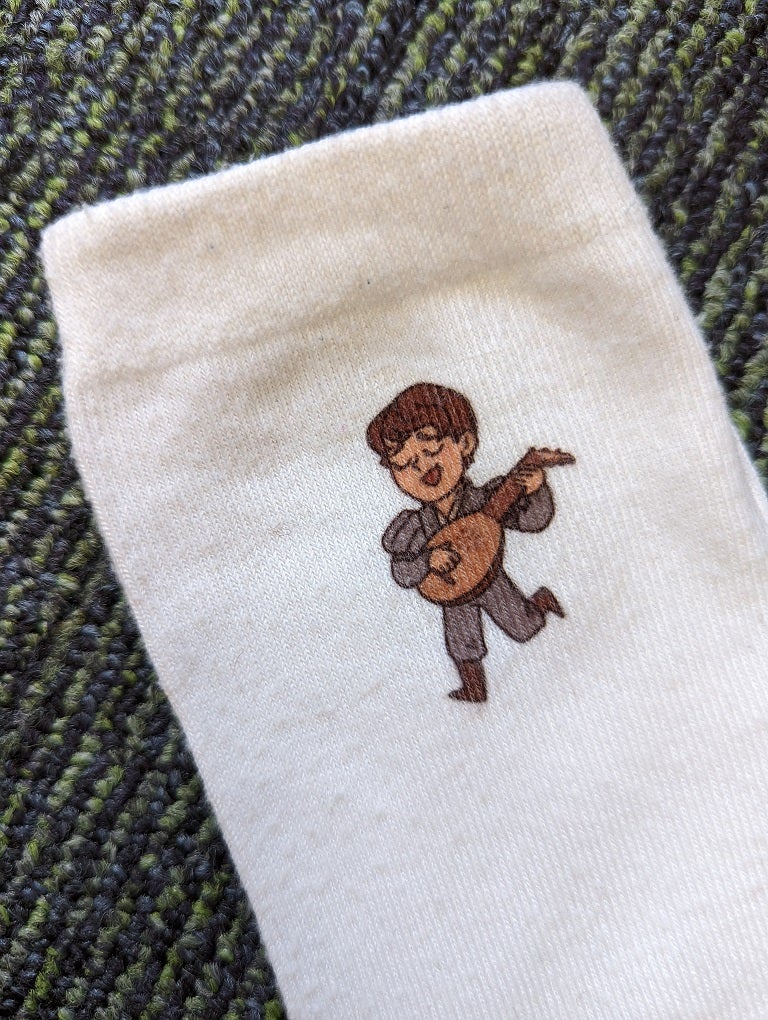You see, I grew up on bards as interpreted by computer games, and to me, there, they were a forgettable class. They were there only to serve others. In Dark Age of Camelot, which I spent a long time playing, the bard-likes were the speed buff your group needed to get around quickly - that was their purpose. They could do a few other things but none as well as the other classes could. And in World of Warcraft, another game I put a lot of time into, bards weren’t a playable class at all. Look across RPGs and it’s a similar story. There’s no bard class in the Divinity: Original Sin series, and in Dragon Age, the whole series, the bard only crops up as playable in Origins as a rogue subclass. Those series couldn’t be more heavily inspired by Dungeons & Dragons and yet, the poor old bard doesn’t get a look-in. And it leaves you wondering why. Or, it reinforces a belief somewhere in your head that bards aren’t good enough to make the cut. The obvious BioWare exceptions, by the way, are Baldur’s Gate and Neverwinter Nights, which are quite old now, and were literally Dungeons & Dragons games. They did have bards. But how many of you played as one? Honestly, I didn’t even notice them - perhaps I had been conditioned not to by then. That’s not to say there haven’t been some good bards in computer games. InXile created a whole series around them - A Bard’s Tale - so they’re well represented there, and chanters in Pillars of Eternity turned out to be one of the strongest support classes. But why you’d choose to play support in a single-player hero fantasy is beyond me. You want the glory, right? The computer can support you. In other words: I had never given bards a chance until, as I said, I one day realised I was one. It was a gentle epiphany, an eyebrow-up and a pout, and it came while I was choosing a class to play in tabletop D&D. In that moment I knew not only who I was but what I was supposed to do, and my understanding of bards changed completely. I’m going to say something quite bold now so don’t be alarmed: I believe bards are the most important characters in fantasy. Quite a turnaround, isn’t it? I believe this because bards do something no other class does, and I think this is a major reason why computer games have such a hard interpreting them. Bards are more than their toolbox of abilities and parts. They’re a class, yes, but they’re also a social role you pledge yourself to when you choose one (unless you’re upending the role for role-playing reasons). Fundamentally, bards are entertainers; they’re talkers, negotiators, intermediaries. Bards are the charismatic heart of a party. When, for instance, my D&D party travels somewhere new, it’s me who usually handles the introductions. I convince nervous people to help us by striking up a tune, I soothe scared children with lullabies, I rock inns with my blaring bagpipes - I know, I’m uber cool. I’ve also gotten us into a lot of trouble because I feel it, all of it, is my duty. That’s what I’m there for. Some of it is to do with my skill proficiencies and Charisma score but a lot of it is not - it comes with the territory. Widen that thought a bit and look around at successful D&D groups, like Oxventure and Critical Role, and you see bards. What would the Oxventure group be without Dob, played by the lovely Luke Westaway? And what would that first season of Critical Role have been like without the amazing songs of Sam Riegel as Scanlan? But widen that thought even more and you begin to see the importance of bards in fantasy more clearly. Look at The Witcher, for example - what would it be without Jaskier (or Dandelion, depending on the name you know him by)? He provokes so much adventure, directly or indirectly, and he gives Geralt a lot to play off of. That dryness of Geralt’s wouldn’t work half as well were it not for the contrasting exuberance of Jaskier. The two together are comedy gold. Everywhere you look in fantasy, you can feel the presence of bards. In Dragon Age 2, Varric narrates the adventure as if he were a storyteller - make him a bard, BioWare, you cowards! In Patrick Rothfuss’ Kingkiller Chronicles, the main character is effectively a bard. And oh my gosh will they not stop singing in The Lord of the Rings. What would fantasy be like without bards? It is born in the exaggerated retelling of stories, built upon it. What good is an adventure if it’s not chronicled and told? This is what’s hard to pin down about bards: it’s the social value in what they do. They’ve done it for thousands of years across human history, their stories and songs interwoven into our hearts and cultures. But how do you program that into a game? It’s not really a numbers thing. Whether anyone can manage, I don’t know, though I’m encouraged when people try. I am looking forward to Baldur’s Gate 3 particularly - yes I saw the recent addition of bards. And if anyone is going to ‘get’ what they do, I think it’s Larian. But perhaps there will always be an elusive side to bards that simply won’t translate. Perhaps in order to really find them, you will need to go tabletop. That’s where I found them, where I found me, and I’m never going to let them go again.
